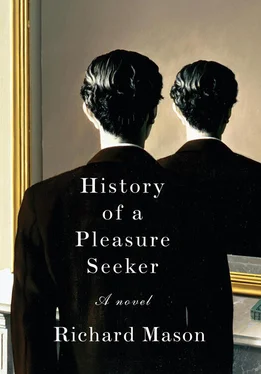The news reached Amsterdam on Wednesday 30th and confirmed to Maarten the centrality of his position in the Almighty’s plans. He resumed his fast as a precaution against resurgent pride and consumed nothing but coffee and rye bread for a further two weeks — because the stock market continued its fall and the situation remained delicate. Having secured six weeks of funding, he did not waste time in courting moneylenders. He threw himself into punishing bouts of prayer, refusing to rise from his knees until the ache in them was agony and his body, like Christ’s, was paying a physical price for the sins of the world.
In the end, further self-sacrifice was required. It took a promise to give to the poor three-quarters of the Plaza’s profits, after interest on its loans was paid, to save the Exchange. Maarten made this pledge in all solemnity on November 14th. The following day, the Dow Jones Industrial Average touched a low of fifty-three, then started to climb; and the confidence this unleashed filled the Plaza’s bar to overflowing, and then its palatial suites, and thus God preserved Maarten from the necessity of requesting more money from his friends.
The banks were quite prepared to lend again, and delighted to serve a client who owned New York’s most fashionable hotel.
Shortly after her father received confirmation that a credit facility of $2 million had been placed at his disposal at the National City Bank of New York, Louisa Vermeulen-Sickerts pulled the silk bellpull outside his office door. She had spent the days of his prayer-filled sequestration energetically and tasted a happiness that her former life of wasteful leisure had never offered her. Overruling Constance, she had sought and discovered an empty shop just off the Kalverstraat on which a year’s lease might be obtained for rather less than the value of her ruby bracelet. She had sold this bauble without embarrassment to Frederik van Sigelen, who had paid a full and generous price, and disposed of a rope of pearls and a pair of diamond earrings similarly. This left her with the funds to pay two cutters and an embroiderer for a year, and her own extensive collection of fabrics would see her through a first season. Though her palms were wet with perspiration, she told her father all this with aplomb.
Maarten, so narrowly rescued from ruin, was in tremendous spirits. “What a kind and generous step to have taken, my darling. I’m sure you would have saved us all from penury.”
This was not at all the response Louisa had expected. Her shoulders relaxed. She sat down. “I have so much to learn from you, Papa, but be assured I will be an attentive and diligent student. If only you will show me how to do the first few months’ accounts, I promise I’ll manage thereafter. Constance has agreed to help in the shop and model the collection. I am certain—”
“But there is no longer any need, my precious.” Maarten squeezed her shoulder. “You must buy back your jewels at once. The world has come to its senses. The Plaza is full. This very morning I have had word that sufficient credit has been extended to see me through, and the refurbishments in London and Frankfurt will soon be finished. You may carry on living gaily amongst your friends.”
“But that is not how I wish to live.”
“Nonsense, my treasure.”
“It is not nonsense, I assure you.”
“You are right.” Maarten grew penitent. “Your motives are generous and thoughtful. I do not mean to disparage your efforts, only to tell you that the crisis has passed.”
“I am glad of that, but I mean to do this, Father.”
“Do what?”
“Open a shop. Make my own money.”
“Whatever do you mean?”
Louisa began at the beginning and repeated her plan in detail. This time she was not nervous but angry.
“It is quite impossible,” said Maarten when she had finished.
“On the contrary. It is quite possible, Papa.”
“Then it is not advisable.”
“On what grounds?”
“On the grounds of decency and common sense, Louisa.”
“Where is the shame in hard work? In making one’s own way, as you yourself—”
“You are not at all in the situation I faced when I was your age. Believe me, you should be glad of that.”
“I am grateful for the start you have given me. But I wish, I wish—”
“What do you wish, my child?”
“To make my own way in the world.”
“Then you must marry a man with talent and ambition, whose interests you may serve as your mother has served mine. That is the way in which a woman may succeed.”
“I am capable of succeeding on my own, Papa.”
“I do not doubt it. But that is not the way of the world.”
Constance Vermeulen-Sickerts had not at all looked forward to fawning over her former rivals in an effort to sell them clothes. She had not been a wholly benevolent ruler of Amsterdam’s jeunesse dorée and she knew she had enemies who would pay large sums to have her kneel at their feet as they tried on shoes. She felt a moment’s disloyal relief to learn of the enterprise’s doom. “My sweet—”
But Louisa stalked past her, closed her door in her face, and dragged the dressing table against it. I will defy them, she thought. I will open my shop whatever they say. But she knew, even as she made these promises, that she would break them. The knowledge inspired a wish to break other things. She flung open her closet and pulled from it all the presents her mother had brought her from New York. She was about to take her scissors to them when a more pointed vengeance occurred to her. She rang for Hilde.
Hilde Wilken was not often summoned by Louisa Vermeulen-Sickerts, except to be told off. When she saw the pile of clothes on the floor and the fury on Louisa’s face, she started to cry.
“No time for tears, Hilde.” Louisa intended to act before her passion cooled, in case she thought better of challenging her parents in this manner. She picked up the dresses. “These are for you.”
“Pardon, miss?”
“These are a gift for you.” Louisa attempted to inject warmth into her voice. She was not over fond of Hilde, whose timidity and lack of initiative annoyed her. She would much rather have given her clothes to Agneta Hemels, who had been an active collaborator in several memorable coiffures. “I wish you to have them,” she repeated, and in her tone was a note of command.
“Yes, miss.” Hilde stopped crying.
Louisa smiled. “You have been a good and loyal servant, and this is your reward. Come, let us find some shoes to match them.”
Like Piet Barol, Egbert had dreamed of conquering his captors before his parents’ return from New York. Their sudden arrival was inhibiting. But the anxiety they brought with them was not. Egbert was used to being the failed member of a high-achieving family; for the first time it seemed that his parents and sisters had troubles of their own, and this gave him strength. So did Piet Barol’s deliberate provocation of the Shadowers, who retaliated only by instructing Egbert not to speak to him — and this was the first commandment he broke. The second was their punishment for this betrayal, which he refused to implement.
He took two warm baths a day as a point of honor, and with each his determination grew. But he did not take the decisive step, and as the household’s confidence seeped back he began to worry that his captors would recover as his family was doing. Piet Barol, after all, was an outsider and a grown-up; perhaps he could flout the Shadowers’ decrees with impunity.
Lying awake one morning, fretting in the dark, Egbert made up his mind to act. He got out of bed. He did not return to it a further six times. Neither did he dress and undress repeatedly. He splashed water on his face, put on his clothes, and bit his lip till he tasted blood. Then he went to his door and opened it. He ran down the stairs and arrived in the entrance hall just as the clock was striking five. The lamps by the front door were burning low and gave an encouraging glow. He paused, but he knew delay would undo him. Like a fugitive evading a distracted guard he ran down the hall, through the dining room, and opened the secret door.
Читать дальше












